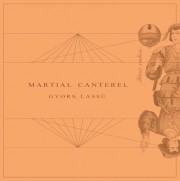Dais Records: Martial Canterel- Gyors, Lassu
Since his first live performances in 2002, Sean McBride, aka Martial Canterel (who also performs as half of the duo Xeno & Oaklander), has crafted his electronic sound in a peculiar intersection between avant-garde and pop. Merging the influences of the first wave of relatively unknown minimal electronic bands in northern Europe, and seminal industrial noise bands such as Throbbing Gristle and SPK, with the smoothly stylish songcraft of early British New Wave, Martial Canterel records and performs using analogue synthesizers, sequencers and drum machines exclusively, molding electricity to fix the action of music creation in substance. The mastery of his composition technique, a second nature of harmonic complexity, along with a unique talent for melodies, enables him to manufacture gems of extreme noise pop, making use of all its unexpected ingredients.
Gyors, Lassù marks an important milestone in the evolution of Martial Canterel‘s music, progressing far beyond the cages of “minimal synth” and embracing the noisier qualities of its sound with a renewed urgency, a kind of thickness embodied in multiple layers using only eurorack, Serge and Roland 100 modular systems at his disposal and flushing out the entire session in one take. Sine waves are rendered into walls of guitar-like noise on songs like “And I Thought”, while the stretching out and liquifaction of what were once very precise pointillistic staccato synth arpeggios are marshaled into layers of violent bliss on “Gyors/Lassù”. The analogue labor and the density of sound highlight the character of continuous performance of the music, where the intertwining of the artist and his work is profoundly material in its quality. As in a modern embodiment of the potter’s wheel…the hands, the texture of clay, with ceramic material. Translated lyrically and conceptually, music performance is for time what travel represents in space, and Gyors/Lassù is the sonic rendering of McBride’s wanderings between Hungary (“Bulvàr”, “Budapest II”) and the South of Italy (“Teano”), between vibrant rhythmic structures and melancholic instrumentals, balancing its bodily intensity with abstract experimentation against the regression of the modern listener.
Listen here and order here.

